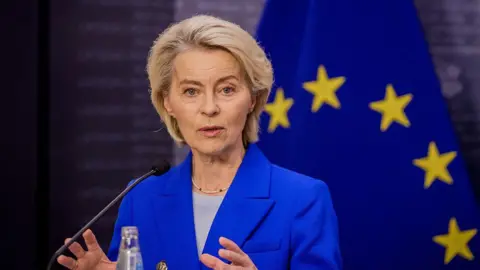European Commission President Ursula von der Leyen has narrowly overcome a confidence vote initiated by a far-right faction within the European Parliament. While the outcome was not unexpected, the mere occurrence of the vote itself indicates a troubling landscape for von der Leyen, who only began her second term last July.
Such confidence votes are uncommon, last witnessed over a decade ago against former Commission chief Jean-Claude Juncker. For the motion to succeed, two-thirds of the 720 Members of the European Parliament (MEPs)—or 480—would have needed to support it. Ultimately, von der Leyen garnered 360 votes against, while only 175 backed the motion, and 18 abstained.
The vote was sparked by Romanian far-right MEP Gheorghe Piperea, who criticized von der Leyen for alleged opacity regarding text messages exchanged with Pfizer's CEO during the procurement of COVID-19 vaccines. The motion accused her Commission of failing to meet the standards of transparency, accountability, and governance essential to maintaining a democratic Union.
During a vigorous parliamentary debate, von der Leyen described her accusers as "conspiracy theorists," dismissing claims surrounding the so-called "Pfizergate" as falsehoods. She asserted that Piperea, whom she labeled as an "extremist," was part of a movement aligned with anti-vaccination and pro-Russian narratives.
Notably, Piperea's motion received backing from several notable figures, including Hungarian Prime Minister Viktor Orban, who called for von der Leyen's resignation. However, Piperea's own European Conservatives and Reformists (ECR) group showed division, with many members from the Brothers of Italy party supporting von der Leyen.
She kept her position primarily due to the backing from her own center-right European People's Party (EPP), alongside the Socialist & Democrats (S&D), liberal Renew, Greens, and left-leaning blocs. Nonetheless, in the days leading up to the vote, various parties expressed unease with her leadership, which has increasingly aligned with far-right factions on various issues, infuriating centrists and leftists.
Valérie Hayer, president of Renew Europe, conveyed her group's conditional support, advising von der Leyen to reassess her partnerships with the far-right to secure future backing. Iratxe García of the S&D stressed the importance of maintaining Commission stability amid ongoing geopolitical challenges, asserting that their vote for von der Leyen was not an endorsement of her leadership style.
Despite tensions surrounding her leadership, von der Leyen remained active internationally and was speaking at the Ukraine Recovery Conference in Rome during the vote. Shortly afterward, she took to social media to express gratitude for the support received, emphasizing the need for unity in the face of external adversities undermining European stability.




















